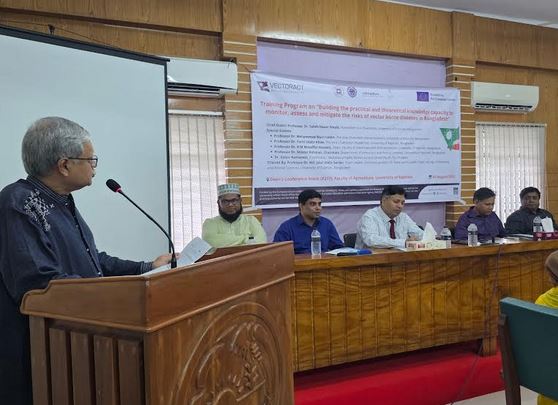News Flash

RAJSHAHI, Aug 3, 2025 (BSS) - Integrated efforts of academic and research organizations can be the crucial means of mitigating vector borne diseases as consequences of those are deadly.
Vector-borne diseases are illnesses transmitted to humans and animals through the bites of arthropod vectors, such as mosquitoes, ticks, and fleas. These diseases can be caused by parasites, bacteria, or viruses.
Academics and experts came up with the observations while addressing the inaugural ceremony of a four-day academic training titled "Investigating Arthropod Vectors and Vector-Borne Pathogens: One Health Concept" at Rajshahi University (RU) today.
The Department of Veterinary and Animal Science (DVAS) as part of implementation of the Vectoract Project organized the training at Agriculture Faculty Dean Complex with international partners emphasizing One Health Approach supported by the European Union.
Vice-Chancellor (VC) of the university Prof Saleh Hasan Naqib addressed the session as the chief guest while Pro-VCs Prof Main Uddin and Prof Farid Uddin Khan and Dean of Veterinary and Animal Sciences Faculty Prof Mozaffor Hossain spoke as special guests with Team Leader of the VECTORACT Project Prof Jalal Uddin Sarder in the chair.
DVAS Chairman Prof Moizur Rahman and Coordinator of VECTORACT Project Dr Gabor Kemensi also shared their expertise on the issue.
Prof Jalal Uddin Sarder told the meeting that vectors are living organisms that can carry disease-causing pathogens like bacteria, viruses and parasites and transmit them from one host to another.
Common vectors include mosquitoes, ticks, fleas, sand flies and triatomine bugs. Vectors transmit pathogens through bites, which can introduce the pathogen into the bloodstream or other tissues of the host.
Malaria, dengue fever, yellow fever, Zika virus, West Nile virus are the mosquito-borne, while Lyme disease, tick-borne encephalitis are the tick-borne.
In his remarks, Dr Gabor Kemensi mentioned that vector-borne diseases are a major public health concern, causing significant morbidity and mortality worldwide, including Bangladesh.
They can have a devastating impact on communities, particularly in resource-limited settings.
He also said climate change is also influencing the spread and distribution of vectors, potentially increasing the risk of these diseases.
Using insect repellent, wearing protective clothing and using mosquito nets and reducing mosquito and tick populations through methods like larviciding, spraying, and habitat management can be the best ways of preventing the diseases.
Apart from this, educating the public about the risks of vector-borne diseases and how to prevent them are needed.